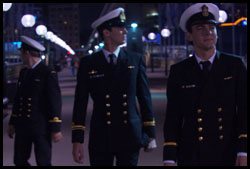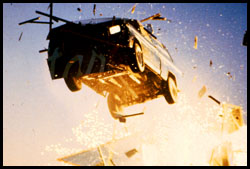 |

|
Blindness |
|
It wasn't 'till the end that
I realized that Meirelles's film was written by TIFF fav Don McKellar (based,
of course, on the celebrated book). Triggered simply by McKellar's involvement
as a cast member I was tweaking on the similarities between this narrative and
his (fantastic) Last Night. Blindness is similarly apocalyptic
(with, of course, a far more serious narrative), as the world goes blind one by
one. Nursing her husband, Jullianne Moore's character is the only sighted
person sent to quarantine, where she must experience the horror through her own
eyes, scenes of filth and disgust hidden from those blind around
her.
Drenched in metaphor, the film creates a suitably somber and tense
mood. Another Canadian film stalwart, Maury Chaykin, plays a man born blind,
uniquely capable due to years of practice of surviving in the wretched
circumstances.
Unflinching, the film nonetheless strives towards some
form of catharsis, an ending that doesn't quite ring true. Still, save for the
overly optimistic conclusion, Blindness is certainly worth, well,
seeing. |
|
 |
|
Directed by: Fernando
Meirelles
Grade:
A- |
|
|
Three Blind
Mice |
|
Three Australian navy boys
are on leave before shipping off to the Gulf. One of them decides to go AWOL,
while his two friends spend the evening looking for him, and try to come to
terms with the violence inflicted upon the seaman by superior
officers.
Heavy handed and dull, there's a film in here somewhere, but
it's burdened by a dry plot and conventional narrative. |
|
 |
|
Directed by: Matthew
Newton
Grade:
C- |
|
|
Good |
|
Yet another World War II
film, but this one has a twist - we see, quite effectively, the small decisions
that when taken together result in the corruption of the soul.
Ever
reliable Viggo Mortensen puts on another masterclass, as he provides a nuanced,
subtle look at a man who's "good", yet drawn deeper and deeper into the Nazi
ethos. With each compromise he descends further and further into that which at
first he finds abhorrent, and few films have so effectively demonstrated how
these seemingly innocuous moments add up in the end to great tragic
events.
While it's not entirely successful, Good transcends mere
morality play, and delves deeply into a subject that still seems ripe for
cinematic exploration. |
|
 |
|
Directed by: Vicente
Amorim
Grade:
B+ |
|
|
Not Quite
Hollywood |
|
An exemplary documentary,
frantic and kinetic, showing the cars, bombs and tits of "Ozploitation" cinema.
Tracing the history of Australian Drive-in Classics, we see clips from a number
of films, many of which I'd never heard of (let alone seen). This is an
excellent primer of this period of cinematic history, and the participants tell
humorous, compelling tales in the well crafted interviews.
The editing
is almost exhausting, as each clip is rammed together, making the pace even
faster than many of the films presented. Quentin Tarantino shows up, and,
weirdly, he seems downright sedate compared to the crazy pace of the rest of
the flick. Still, the doc never loses sight of its goals, and the frenetic pace
is the perfect medium for this tale. Truly a memorable ride, and a sublime
midnight delight, a greatest hits that, synergistically, supersedes its many
clips and creates a whole greater than its parts. |
|
 |
|
Directed by: Mark
Hartley
Grade: A |
|
|
 |
|
